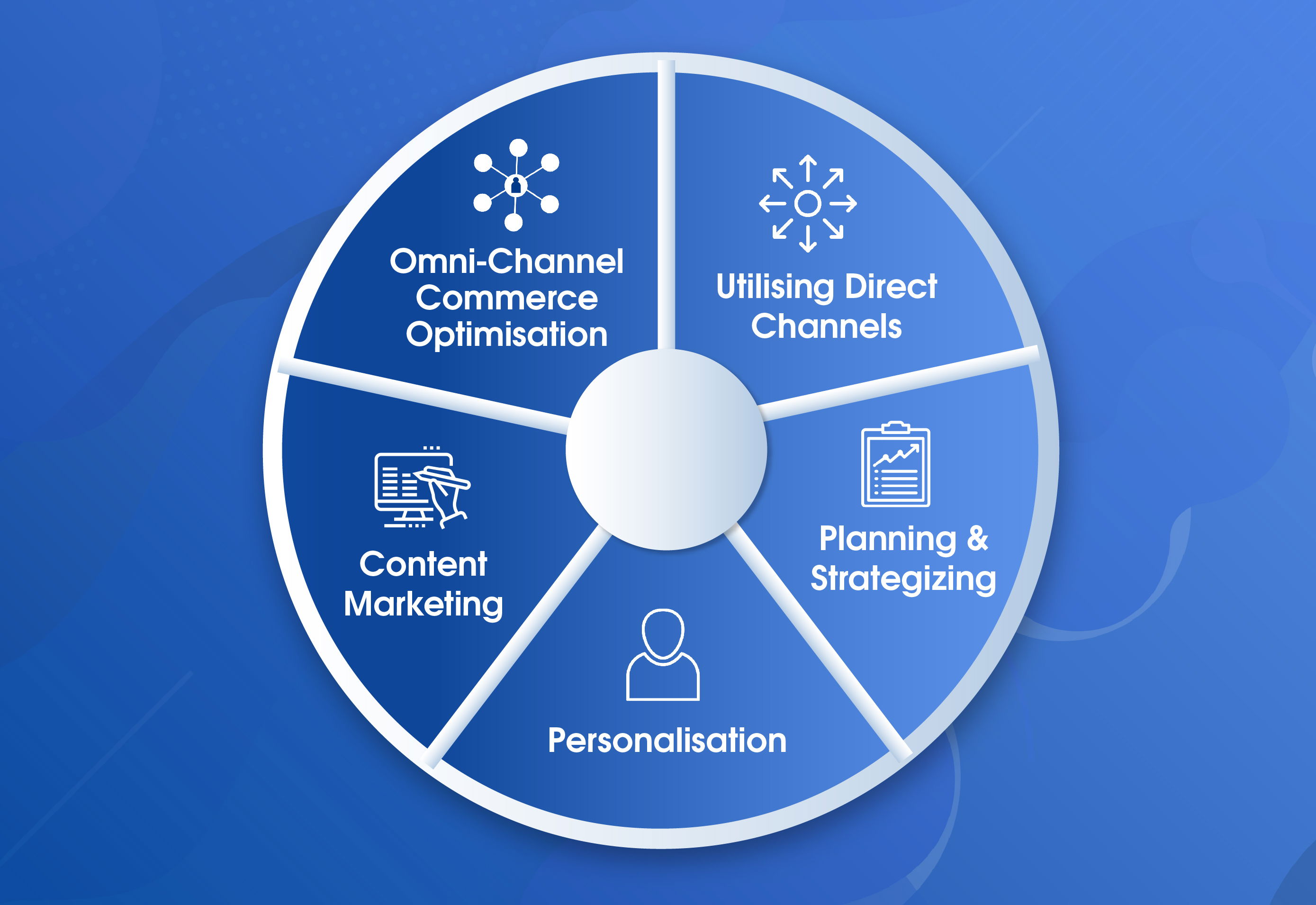Top 5 Services in Digital Commerce

Digital Commerce, or as many often call it, e-commerce, isn't just about buying or selling online anymore. It's an evolving landscape encompassing the entire customer journey, from awareness to consideration and purchase to post-purchase experiences. With the digital revolution, businesses are not merely transferring their on-ground strategies online but are evolving with novel strategies, technologies, and services that redefine how consumers interact with brands. In this insightful dive, we'll explore the forces shaping the future of Digital Commerce, from AI recommendations to the role of blockchain.

Personalised AI-driven Recommendations: The Game Changer in Customer Experience
1.Revolutionizing Shopping with AI
Ever dreamt of walking into a store where everything aligns with your desires? This is no longer a fantasy, thanks to AI's role in e-commerce and digital marketing. AI-driven recommendations dive deep into a user's online actions, from past purchases to search patterns, presenting them with spot-on product suggestions. The result? Boosted sales and a foundation of trust between companies and their customers.
Why is this pivotal?
Enhanced User Experience: Shoppers are introduced to handpicked items, eliminating the need to wade through irrelevant choices and enriching their shopping journey.
Higher Conversion Rates: Personalized recommendations mean users find what they love faster, reducing abandoned carts and sealing sales more efficiently.
Building Trust: Feeling understood fosters loyalty. When AI consistently meets user preferences, it emulates the warmth of a familiar local shop.
The Tech Behind It:
Swift Data Analysis: If you looked up hiking boots, AI ensures you'll soon see related gear, like trail backpacks.
Ever-evolving Recommendations: As trends change, AI adapts, keeping its suggestions timely and relevant.
Digital Marketing Synergy: AI's magic isn’t restricted to e-commerce. Understanding user habits refines when and where to display ads for maximum impact.
Seamless Omni-Channel Integration: Blurring the Lines Between Online and Offline Retail
2.Omni-Channel: Retail's Seamless Evolution
Today's retail environment is evolving rapidly, led by omnichannel integration. This approach erases the lines between online and brick-and-mortar shopping. Customers might start browsing a product on their mobile app during a commute, delve deeper on a desktop, and eventually purchase it in-store. Imagine spotting a dress online and, hours later, trying it on at a local store.
What makes omnichannel integration a retail revolution?
Unified Customer Experience: It’s about brand consistency. Whether a consumer interacts with a brand through an app, website, or physically, the essence, branding, and service quality remain unchanged, providing a familiar environment at every touchpoint.
Holistic Data Collection and Analysis: This integration is a treasure trove for retailers. By capturing data from both online clicks and in-store footfalls, they can weave together a comprehensive understanding of consumer behaviour. Such insights empower them to craft finely-tuned marketing strategies that hit the mark.
Increased Sales Opportunities: Customers with multiple avenues to explore are more likely to purchase. They can choose the most convenient route: online quick shipping, store pick-up, or traditional shopping.
Enhanced Customer Loyalty: By offering flexibility and convenience, retailers understand and cater to modern consumer needs. This not only enhances immediate sales but fosters long-term loyalty.
Inventory Management Perks: Retailers can track products in real time across all platforms. If a product is out of stock online but available in-store, the customer can be directed there, ensuring no lost sales.
Subscription Models & Box Services: Why Consumers Can't Get Enough
3.Subscription Boxes: Delight Delivered Monthly
In a world where personalisation and convenience are at the forefront of consumer preferences, subscription services and box models have emerged as dominant forces. They have exploded in popularity over the past few years, catering to many niches. From monthly gourmet food boxes and beauty product samples to handpicked books or expertly chosen fashion selections, there's a subscription box for virtually every interest and hobby. At the heart of their appeal is the sheer delight of receiving a "gift" every month, meticulously curated to reflect individual tastes and preferences.
But what makes these services resonate so profoundly with consumers?
Anticipation and Surprise: Every month brings the exhilaration of unboxing something new. This sense of anticipation and the joy of discovering new products or brands make each delivery special.
Value for Money: Many subscription services offer products at a fraction of their retail price, providing consumers with savings and the chance to try before investing in full-sized products.
Convenience: In today's fast-paced world, having products delivered straight to one's doorstep eliminates the need for repeated store visits. Busy individuals especially value this convenience.
Augmented Reality (AR) Shopping: The Virtual Dressing Room Revolution
4. AR Transforms Digital Commerce
Modern shoppers no longer need to physically try on clothes or visit home to see how a new sofa will fit. Augmented Reality (AR) in digital commerce brings a transformative experience to online shopping. Through AR, products come alive on screens, allowing consumers to visualise items in their real-world context. Major brands have already incorporated AR into their apps to offer virtual try-ons, home decor visualisations, and virtual store tours.
Why is AR gaining such traction?
Personalised Shopping Experience: AR goes beyond just visualising products. It tailors the experience according to individual user preferences and spatial constraints, ensuring a highly personalised shopping journey.
Boost in Consumer Confidence: Visualizing a product in one's personal space instils greater confidence in purchasing. Customers feel more assured of their choices, knowing precisely what they're investing in.
Enhanced Brand Loyalty: Offering AR features signifies that a brand is modern, tech-savvy, and customer-centric. This attracts new customers and ensures that existing ones stay loyal, appreciating the enhanced shopping experience.
Blockchain and Digital Commerce: Ensuring Transparency and Trust in Every Transaction
5.Blockchain's Impact on E-Commerce
In today's digital age, where data breaches and cyber threats are rising, the importance of secure and transparent transactions cannot be overstated. Enter blockchain, a technology primarily associated with cryptocurrencies like Bitcoin. Yet, its influence extends far beyond just digital currencies. Blockchain's intrinsic design promises a level of transparency and security that's unprecedented in digital commerce. At its core, it provides a decentralised ledger system where each transaction is chronologically recorded and cannot be altered once verified. This immutability has significant implications for the e-commerce sector.
End-to-End Product Verification: Blockchain allows for granular tracking of products. Consumers can view its entire lifecycle as a luxury handbag or an organic fruit. This ensures they're getting genuine products, free from counterfeits.
Decentralised Marketplaces: The decentralised nature of blockchain paves the way for peer-to-peer marketplaces where buyers and sellers can transact without intermediaries. This not only reduces costs but also empowers smaller businesses to compete on a global scale.
Smart Contracts: These are self-executing contracts with the terms directly written into code lines. In e-commerce, they can automate and streamline processes like payment release upon product delivery, ensuring both parties fulfil their end of the deal.
Reduced Transaction Fees: Traditional payment systems often involve multiple intermediaries, each taking a cut. Blockchain transactions, being peer-to-peer, can significantly reduce these costs, offering savings to both businesses and consumers.
Conclusion
The world of Digital Commerce is a vast, ever-evolving landscape. From the surge of personalised AI-driven recommendations to the trust instilled by blockchain, the industry is experiencing a revolutionary shift. As we await further technological advancements, one thing remains certain: Digital Commerce will continue to shape how we shop, interact, and experience brands. Are you ready for the future?
FAQs:
What is digital commerce?
Digital commerce encompasses buying and selling products or services using the internet and transferring money and data to execute these transactions.
How is the digital signature in e-commerce enhancing security?
Digital signatures provide security by encrypting data, ensuring the seller's authenticity and protecting the purchase order's data integrity.
Why are subscription-based models gaining popularity in digital commerce?
They offer consumers curated, regular experiences and the thrill of anticipation, and often come with cost savings over time.
What are the benefits of direct-to-consumer (D2C) models?
D2C models enable brands to bypass intermediaries, resulting in cost savings, more control over brand messaging, and a direct relationship with the consumer.
How are technologies like AI and VR impacting digital commerce?
They are revolutionising the shopping experience by providing personalised recommendations, virtual try-on, and immersive shopping environments.








